- Home
- Kim Newman
Angels of Music
Angels of Music Read online
Contents
Cover
Also by Kim Newman
Title Page
Copyright
Dedication
Act One: The Marriage Club
I
II
III
IV
V
VI
VII
VIII
IX
X
XI
XII
XIII
Act Two: Les Vampires de Paris
I
II
III
IV
V
VI
VII
VIII
IX
X
XI
XII
XIII
XIV
XV
XVI
XVII
Entr’acte: The Case of Mrs Norton
Act Three: Guignol
I
II
III
IV
V
VI
VII
VIII
IX
X
XI
XII
XIII
Act Four: The Mark of Kane
I
II
III
IV
V
VI
VII
VIII
IX
X
Act V: Deluge
I
II
III
IV
V
VI
VII
VIII
IX
X
XI
XII
Notes and Acknowledgements
About the Author
Also Available from Titan Books
After the Curtain
Also by Kim Newman and available from Titan Books:
Anno Dracula
Anno Dracula: The Bloody Red Baron
Anno Dracula: Dracula Cha Cha Cha
Anno Dracula: Johnny Alucard
An English Ghost Story
Professor Moriarty: The Hound of the D’Urbervilles
The Secrets of Drearcliff Grange School
Jago
The Quorum
Life’s Lottery
Bad Dreams
The Night Mayor
ANGELS OF MUSIC
Print edition ISBN: 9781781165683
E-book edition ISBN: 9781781165690
Published by
Titan Books
A division of Titan Publishing Group Ltd
144 Southwark Street
London
SE1 0UP
First edition: October 2016
1 3 5 7 9 10 8 6 4 2
This is a work of fiction. Names, characters, places, and incidents either are the product of the author’s imagination or are used fictitiously, and any resemblance to actual persons, living or dead, business establishments, events, or locales is entirely coincidental. The publisher does not have any control over and does not assume any responsibility for author or third-party websites or their content.
Copyright © October 2016 by Kim Newman. All rights reserved.
No part of this publication may be reproduced, stored in a retrieval system, or transmitted, in any form or by any means without the prior written permission of the publisher, nor be otherwise circulated in any form of binding or cover other than that in which it is published and without a similar condition being imposed on the subsequent purchaser.
A CIP catalogue record for this title is available from the British Library.
Did you enjoy this book? We love to hear from our readers. Please email us at [email protected] or write to us at Reader Feedback at the above address.
To receive advance information, news, competitions, and exclusive offers online, please sign up for the Titan newsletter on our website: www.titanbooks.com
For Randy and Jean-Marc Lofficier
Christine Daaé – the Angel of Song
Trilby O’Ferrall – the Angel of Beauty
Irene Adler – the Angel of Larceny
La Marmoset – the Angel of Light
Sophy Kratides – the Angel of Vengeance
Unorna – the Angel of Magic
Ayda Heidari – the Angel of Blood
Ysabel de Ferre – the Angel of Rapture
Hagar Stanley – the Angel of Insight
Katharine Reed – the Angel of Truth
Clara Watson – the Angel of Pain
Lady Yuki – the Angel of the Sword
Gilberte Lachaille – the Angel of Love
Elizabeth Eynsford Hill – the Angel of Many Voices
Riolama – the Angel of the Air
Alraune ten Brincken – the Angel of Ill Fortune
Olympia – the Clockwork Angel
Thi Minh – the Angel of Acrobatics
ACT ONE: THE MARRIAGE CLUB
‘“The requiem mass is not at all gay,” Erik’s voice resumed, “whereas the wedding mass – you can take my word for it – is magnificent! You must take a resolution and know your own mind! I can’t go on living like this, like a mole in a burrow! Don Juan Triumphant is finished; and now I want to live like everybody else. I want to have a wife like everybody else and to take her out on Sundays. I have invented a mask that makes me look like anybody. People will not even turn round in the streets. You will be the happiest of women. And we will sing, all by ourselves, till we swoon away with delight. You are crying! You are afraid of me! And yet I am not really wicked. Love me and you shall see! All I wanted was to be loved for myself. If you loved me I should be as gentle as a lamb; and you could do anything with me that you pleased.”’
Gaston Leroux, The Phantom of the Opera (1909–10)
I
TOWARDS THE END of the seventies – that colourful, hectic decade of garish clothes, corrupt politics, personal excess and trivial music – three girls were sent to the Paris Opéra. They could dance a little, sing a little more, were comely when painted and cut fine figures in tights. Were the world just, they would have been stars in the ascendant. Leading roles would have been assigned to them. Rewards would have come along… fame, riches and advantageous marriages.
However, a rigid system of seniority, patronage and favour-currying then governed the house. Our heroines, no matter how perfectly they trilled audition pieces or daintily they lifted skirts from shapely calves, were of the ‘untouchable’ caste, and fated to remain in the depths of the chorus. If critic or admirer or patron were to call public attention to their qualities, they would likely find themselves cast as slaves in the next production, faces blacked with burnt cork, holding the Queen’s train at the rear of the stage. Such was the ruthless dictate of the house’s reigning diva, Signorina Carlotta Castafiore.
Yet… Christine Daaé had a Voice. Trilby O’Ferrall had a Face. And Irene Adler had a Mind. When they arrived at the Opéra, the women were gems in the rough. To be revealed as diamonds of the first water, they required polish, cutting and careful setting. Without such treatment, they were likely to become dull pebbles, lost among so many other shingles on the beach.
Many equally appealing young ladies have served years in the chorus as their brothers served terms in the armed forces (or prison), trying not to squander meagre pay on absinthe or cards, hoping to emerge whole in mind and limb from regular ordeals, dreaming of comfortable retirement. At best, they might end up the second wives of comfortable widowers; at worst, they might… well, ‘at worst’ is too hideous to be dwelled upon, save to observe that such as they were found ragged on the cobbles or drowned in the Seine with a frequency which verged upon the scandalous.
These demoiselles tended to attract the puppy-
like devotions of decent, dull-witted youths and the carnivorous attentions of indecent, cold-hearted roués. Our trio, in their private dreams, yearned for a different stripe of suitor – mysterious, dominating, challenging. Without such a presence in their lives, the girls lacked direction. But, even kept outside the circle of the limelight, they had an unnerving tendency to sparkle. Carlotta saw the shimmering in her wake, and made sure they stayed in shadow. Nevertheless, one by one, they were noticed… not by the stuffy and harassed management or the violently partisan audience claques, but by a personage who saw into their secret selves.
This unique individual was at once Christine’s Trapdoor Lover, Trilby’s Mesmerist Genius and Irene’s Mastermind of Intrigue. All Paris knew him as the Opera Ghost, though most deemed him a phantasm rather than a phantom. He was a bogey conjured by stagehands to throw a scare into pretty little ballerinas, not the spectre of a dead man whose bones lay unshriven in a recess of Charles Garnier’s palatial opera house. Those who had cause to believe the Phantom of the Opera a man of flesh and bone were wise enough not to speak of him. There were rumours about what happened to those who earned his displeasure.
His protégées came to know him as Monsieur Erik.
Among the Phantom’s few intimates was the Persian. The exact function of this long-faced, astrakhan-capped fellow at the opera house was hard to determine but evidently essential. The girls flitted through a surface world of upholstered finery, fashionable cafés and society engagements, of grand opening nights and merry madcap balls; the Opera Ghost confined himself to the decaying, watery labyrinth below street level, among the scenery of out-of-fashion productions and tombs of tortured men. Only the Persian passed easily between the two realms. It was said he was the only man living who had seen the true face behind mirror and mask, though some claimed to have glimpsed a yellow-eyed, noseless spectre in Box Five, upon which it had a permanent lease.
From behind a mirror in Dressing Room 313, Erik gave ‘music lessons’, whispering for hours to his songbirds – his Swedish-born French nightingale, French-born Irish thrush and All-American eagle. He first discovered Daaé, his most naturally gifted pupil, and called from her a voice to rival the angels. Moreover, he taught her to feel the music, to imbue the polite perfection of her natural tones with the rude turbulence of her young heart. Thanks to Erik, Christine’s voice could reach and affect in a manner those who heard it would never forget, though for her finest performances her only auditor was a single, tattered soul weeping under his mask.
O’Ferrall, near death after a spell under another mesmeristtutor, was cracked in voice, body and spirit when brought to Erik. He repaired her voice if not to its former, artificial magnificence – once, briefly, she had performed at the highest level – then at least to pleasant adequacy. Not a natural singer like Christine, Trilby was, if properly presented, the greatest beauty of the age, an attainment involving at least as much sacrifice and special exercise as musical distinction.
Adler, the American, was warier, less obviously talented, too strong-willed for the special tutelage Erik bestowed upon her sisters in song, but prodigiously gifted. She could turn her quick mind and light fingers to almost anything. Irene’s involvement with the Agency was a matter of negotiation towards mutual advantage rather than submission to the will of the Opera Ghost.
Each, in her own way, benefited from Erik’s work with them, and grew when they worked together. Collaboration went against the instincts of the potential diva in each… but they were more effective as a trio than they would have been as three solo turns. Should their maestro have been interested, a healthy income could have been generated by hiring out les trois jolis anges as entertainment for cafés, society functions, musical soirées, orgies, weddings, funerals and the like… but his vision for his protégées was of a different stripe. He saw in them deeper, more specialised talents and was determined they should be put to good use. A mystery himself, Erik set out to rid the city – à terme, all France (and overseas territories and possessions) – of competition. His own mask would stay in place, but all others would be lifted.
Though seldom seen above street level, Erik founded a private enquiry agency. Just as an opera director does not appear on stage, except to take bows after a first night, Erik remained in his well-appointed cellars while his protégées acted on his behalf and received the applause due to them.
It was circulated in the proverbial circles that those who wished to engage the Opera Ghost Agency must first make contact with the Persian or, for more delicate matters, Madame Giry, the Keeper of Box Five. These loyal operatives would convey the details of the case to the Phantom himself. Often Erik was already well apprised of matters in which prospective clients wished him to take an interest. Thanks to an intricate array of tubes and shutters, he could eavesdrop on gossip uttered in any box, dressing room or lavatory in the house. Few matters of moment troubled the city without being discussed somewhere within the Paris Opéra. Once a case came to Erik’s attention, it was his decision – unaffected by the scale of fee on offer – whether a commission was accepted or declined.
If accepted, a bell sounded.
II
BELLS WERE FOREVER ringing around the house, to summon artistes, dressers, musicians, commissionaires, wine-waiters, clerks, servants, composers, scene-shifters, rat-catchers, chorus girls, washer-women. Bells were sounded to alert the audience when a performance was about to commence or resume. Not to mention the cow-, sheep- or goat-bells rung by percussionists when pieces with rustic settings were given. Only a finely tuned ear could distinguish individual tones among such tintinnabulation. But our three girls knew their bell. When it tinkled, anything they happened to be doing – no matter how important – was set aside in their haste to make their way to a dressing room at the end of a basement corridor which had apparently been abandoned as too far from the great stage for convenience.
When Erik rang the bell, Christine Daaé was in a scuttle-shaped bathtub, all a-lather, singing scales… Trilby O’Ferrall was posing in a sunlit upper room for a class of impoverished art students who’d pooled meagre funds to purchase an hour of her time… and Irene Adler was practising her lock-picking blindfolded, working away with hairpins and clever fingers.
Within moments, the tub stood empty, the students disappointed and the lock unpicked. The girls nipped swiftly to answer the summons, using dumb-waiters, trapdoors and other byways known only to intimates of Charles Garnier. They arrived simultaneously at Dressing Room 313. The Persian looked up from the latest number of La Petite Parisien and flapped a hand at them, the smoke from his Turkish cigarette making a question mark in the air. The trio arranged themselves on a divan before the large, green-speckled mirror. Christine and Trilby were still wriggling into suitable clothes. They helped each other with hooks and buttons. Irene coolly replaced the pins she had been using as lock-picks. When the Persian turned down the gaslight, it was possible to discern a chamber beyond the mirror’s thin silvering. A slender shadow stood there, extravagantly cloaked and hatted, violin tucked under his chin. Erik extemporised the sort of ‘hurry up’ trill used to encourage unpopular acts to get off the stage in salles des variétés as the girls concluded their business with a minimum of pinching and tutting.
‘What’s the ruckus this time, Bright Boy?’ asked Irene, whose speech still bore the pernicious influence of her native New Jersey. ‘Is some mug tryin’ ta knock over the Louvre again?’
‘Could it be a plot to bring down the government?’ asked Trilby.
‘Or set off dynamite under Notre-Dame?’ asked Christine.
The Persian exhaled a smoke ring. ‘Nothing so everyday, ladies.’
All eyes turned to the mirror. Trilby, by a degree the prettiest of our trio and a long chalk the most vain, fussed with her short brown curls, accompanied by a teasing little violin tune. She noticed the others looking at her, smiled sweetly and put her hands in her lap as if about to listen dutifully to a sermon.
The vio
lin was set down and a sepulchral voice sounded, conveyed into the room through a speaking tube with a woodwind tone.
‘Our client,’ said Erik, ‘is most exalted. In fact, a president.’
‘The President of the Republic!’ exclaimed Christine, saluting.
With the shortage of male chorus – thanks to the brutal levies of the Franco-Prussian War, the Siege, the Commune and la Semaine Sanglante – the boyish Daaé frame was often gussied up en travestie in braided uniform. She was better at close-order drill than any lad in the company. Off duty, as it were, she often favoured military tunics. Though born in Sweden, she had been raised mostly in France and was a true patriotess. She could have posed for the image of Marianne if, unlike the often-painted Trilby, she were not addicted to the fidgets.
‘It can’t be that maroon in the White House!’ said Irene Adler.
‘Ireland hasn’t got a president, more’s the pity,’ muttered Trilby – born in Paris of an Irish father and a French mother, never to set foot on the green sod from which she inherited her complexion. ‘Just the cursed God English, and their fat little German Queen.’
‘Our client is far more respected than a mere head of state,’ said Erik. ‘She is la Présidente. Apollonie Sabatier, née Joséphine-Aglaé Savatier. Her salon may be more vital to la vie parisienne than any government building, museum or cathedral.’
‘Salon?’ queried Christine.
‘He means whorehouse,’ explained Irene. ‘What Miss Potato’s Limey oppressors call “a knocking-shop”.’
Trilby good-humouredly stuck her tongue out at Irene.
‘I’ve heard of Madame Sabatier,’ said Trilby. ‘She’s one of those Horizontal Giantesses.’
‘Indeed,’ continued Erik. ‘The most upstanding, indeed paradoxically vertical of the nation’s grandes horizontales. You will have seen her portrait by Meissonier, her statue by Clésinger.’
‘That Baudelaire freak was nuts about her,’ said Irene.
There was a pause. It would be easy to conceive of a yellowish, skeletal brow wrinkling in a frown, a lipless mouth attempting a moue of displeasure, a glint of irritation in sunken yellow eyes.

 The Bloody Red Baron
The Bloody Red Baron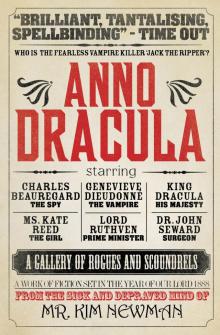 Anno Dracula
Anno Dracula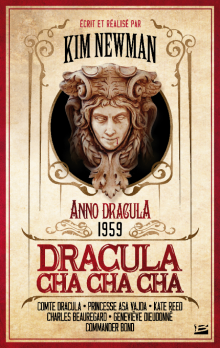 Dracula Cha Cha Cha
Dracula Cha Cha Cha Anno Dracula 1999
Anno Dracula 1999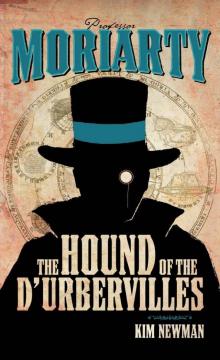 Moriarty: The Hound of the D'Urbervilles
Moriarty: The Hound of the D'Urbervilles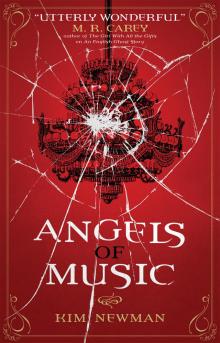 Angels of Music
Angels of Music The Man From the Diogenes Club
The Man From the Diogenes Club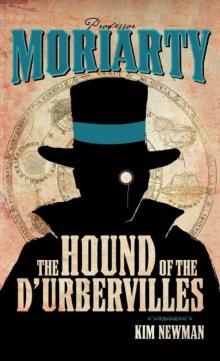 Professor Moriarty: The Hound Of The D’urbervilles
Professor Moriarty: The Hound Of The D’urbervilles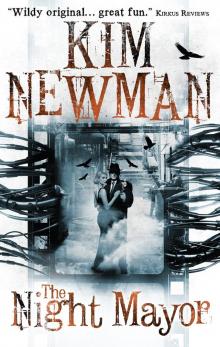 The Night Mayor
The Night Mayor Back in the USSA
Back in the USSA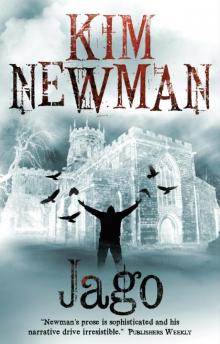 Jago
Jago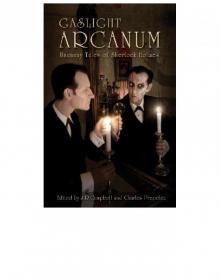 Gaslight Arcanum: Uncanny Tales of Sherlock Holmes
Gaslight Arcanum: Uncanny Tales of Sherlock Holmes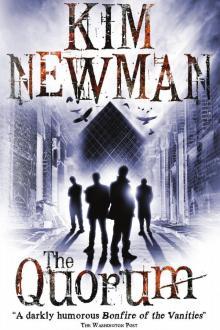 The Quorum
The Quorum Anno Dracula 1899 and Other Stories
Anno Dracula 1899 and Other Stories Life's Lottery
Life's Lottery The Secrets of Drearcliff Grange School
The Secrets of Drearcliff Grange School Anno Dracula ad-1
Anno Dracula ad-1 The Bloody Red Baron: 1918 ad-2
The Bloody Red Baron: 1918 ad-2 An English Ghost Story
An English Ghost Story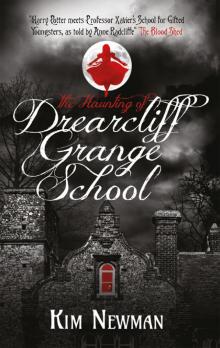 The Haunting of Drearcliff Grange School
The Haunting of Drearcliff Grange School The Other Side of Midnight
The Other Side of Midnight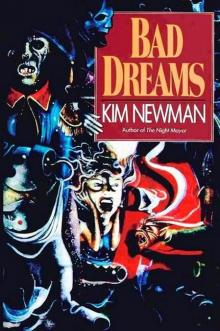 Bad Dreams
Bad Dreams Anno Dracula--One Thousand Monsters
Anno Dracula--One Thousand Monsters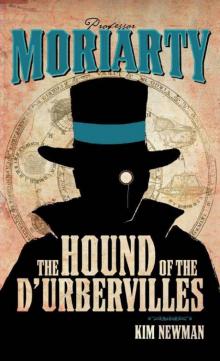 The Hound Of The D’urbervilles
The Hound Of The D’urbervilles The Bloody Red Baron: Anno Dracula 1918
The Bloody Red Baron: Anno Dracula 1918